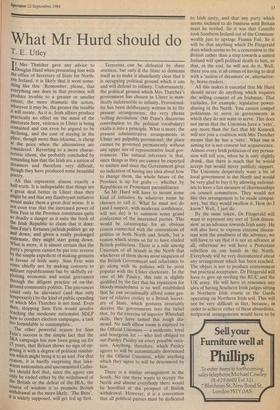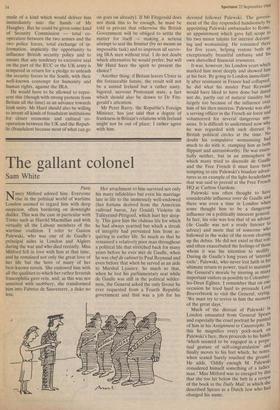What Mr Hurd should do
T. E. Utley
If Mrs Thatcher gave any advice to Douglas Hurd when presenting him with the office of Secretary of State for North- ern Ireland, it is likely that it went some- thing like this: 'Remember, please, that everything one does in that province will produce trouble to a greater or smaller extent; the more dramatic the action, Whatever it may be, the greater the trouble It will create. As it is, Irish affairs produce Practically no effect on the mind of the electorate here, violence in Ulster is being contained and can even be argued to be declining, and the cost of staying in the place, though more than irksome, is cheap at the price when the alternatives are considered.' Reverting to a more charac- teristic idiom, she probably concluded by reminding him that the Irish are a nation of dreamers and therefore very difficult, though they have produced some beautiful Poetry.
All this represents almost exactly a half-truth. It is indisputable that things are a great deal better in Ulster than they Tight be and that any flamboyant initiative would make them a great deal worse. It is not even true that the increased power of Sinn Fein in the Province constitutes quite so deadly a danger as it suits the book of the Irish Republic to claim that it does: Sinn Fein's fortunesliMIrish politics go up and down; and given a really prolonged stalemate, they might start going down. What is more, it is almost certain that the Party's progress cannot be put into reverse by the simple expedient of making gestures in favour of Irish unity. Sinn Fein wins votes chiefly not by making converts to militant republicanism but by skilfully ex- ploiting economic and social grievances through the diligent practice of on-the- ground community politics. The grievances could only be alleviated (and that only temporarily) by the kind of public spending of which Mrs Thatcher is not fond. Even then, stopping Sinn Fein would involve teaching the moderate nationalist SDLP how to conduct election campaigns, a task too formidable to contemplate. The other powerful reason for Sinn Fein's success is the simple fact that the IRA campaign has now been going on for 15 years, that Britain shows no sign of op- posing it with a degree of political resolut- ion which might bring it to an end. For that reason, it is hardly surprising that luke- warm nationalists and uncommitted Catho- lics should feel that, since the agony can only be ended either by the withdrawal of the British or the defeat of the IRA, the course of wisdom is to promote British Withdrawal as the more likely. 'The Brits', it Is widely supposed, will get fed up first. Terrorists can be defeated by sheer attrition, but only if the State so demeans itself as to make it abundantly clear that it is occupying political ground which it can and will defend to infinity. Unfortunately, the political ground which Mrs Thatcher's goyernment has chosen in Ulster is man- ifestly indefensible to infinity. Provisional- ity has been deliberately written in to the present arrangements; the very phrase 'rolling devolution' (Mr Prior's disastrous contribution to the political vocabulary) exalts it into a principle. What is more, the present administrative arrangements in Ulster are palpably provisional; the place cannot be governed permanently without any upper tier of representative local gov- ernment. The natural inference is that, since things as they are cannot be expected to endure and since the Government gives no indication of having any idea about how to change them, the whole future of the Province is up for grabs — whether by Republican or Protestant paramilitaries.
So Mr Hurd will have to mount some kind of initiative by whatever name he chooses to call it. What he must not do (and I suspect, with moderate confidence, will not do) is to summon some grand conference of the interested parties. This would be catastrophic for an obvious reason connected with the conventions of politics in both North and South, but a reason which seems so far to have eluded British politicians. There is a rule among Unionists of all brands in the North that whichever of them shows most suspicion of the British Government and reluctance to go along with its policies will be most popular with the Ulster electorate. In the case of Mr Paisley, this rule is slightly qualified by the fact that his reputation for bloody-mindedness is so well established that he can occasionally afford some ges- ture of relative civility to a British Secret- ary of State, which gestures invariably deceive the governments into the belief that, by the exercise of superior Whitehall skills, they have tamed this rough dia- mond. No such elbow room is enjoyed by the Official Unionists — a moderate, loyal and bourgeois lot — who feel obliged to out-Paisley Paisley on every possible occa- sion. Anything, therefore, which Paisley agrees to will be automatically denounced by the Official Unionists, while anything which they agree to will be denounced by him.
There is a similar arrangement in the South. No one there wants to occupy the North and almost everybody there would be horrified at the prospect of British withdrawal. However, it is a convention that all political parties must be dedicated to Irish unity, and that any party which seems inclined to do business with Britain must be reviled. So it was that Costello took Southern Ireland out of the Common- wealth just to upstage Fianna Fail. So it will be that anything which Dr Fitzgerald does which seems to be a concession to the British rather than a step towards a united Ireland will spell political death to him, so that, in the end, he will not do it. Well, there you are, it all comes of having to deal with a 'nation of dreamers' or, alternative- ly, horse-traders.
All this makes it essential that Mr Hurd should never do anything which requires the willing consent of an Irishman. That excludes, for example, legislative power- sharing in the North. You cannot compel politicians to serve in governments in which they do not want to serve. This does not mean that the Unionists have a 'veto', any more than the fact that Mr Kinnock will not join a coalition with Mrs Thatcher means that he has a 'veto'. What one is aiming for is not consent but acquiescence. Almost every Irish politician of any persua- sion will tell you, when he is only slightly drunk, that there is much that he would accept but would never publicly support. The Unionists desperately want a bit of local government in the North and would be very glad to buy it by allowing national- ists to have a fair measure of chairmanships on council committees. They would not like this arrangement to be made compul- sory, but they would swallow it. How do I know? Well, I just do.
By the same token, Dr Fitzgerald will want to represent any sort of 'Irish dimen- sion' as an advance towards Irish unity. He will also have to express extreme discon- tent with the smallness of the advance; we will have to say that it is not an advance at all, otherwise we will have a Protestant rebellion on our hands in the North. Everybody will be very discontented about any arrangement which has been reached.
The object is not to produce contentment but practical acceptance. Dr Fitzgerald will have to give up reviling the RUC and the UK army. He will have to renounce any idea of having Southern Irish judges sitting in Northern Irish courts or the Garda operating on Northern Irish soil. This will not be very difficult in fact, because, in order to achieve either of these absurdities, reciprocal arrangements would have to be made of a kind which would deliver him immediately into the hands of Mr Haughey. But he could be given some kind of Security Commission — total co- operation between the two armies and the two police forces, total exchange of in- formation, implicitly the opportunity to influence British security policy and to ensure that any tendency to excessive zeal on the part of the RUC or the UK army is tempered in return for a pledge to unleash the security forces in the South, with their well-known contempt for humanity and human rights, against the IRA.
He would have to be allowed to repre- sent this (though with strong protests from Britain all the time) as an advance towards Irish unity. Mr Hurd should also be willing to invent all kinds of fraudulent institutions for closer economic and cultural co- operation between the UK and the Repub- lic (fraudulent because most of what can go on goes on already). If Mr Fitzgerald does not think this to be enough, he must be told in private that otherwise the British Government will be obliged to settle the matter for itself — making a serious attempt to seal the frontier (by no means an impossible task) and to imprison all surviv- ing IRA men without trial. I do not doubt which alternative he would prefer, but will Mr Hurd have the spirit to present the choice?
Another thing: if Britain leaves Ulster in the foreseeable future, the result will not be a united Ireland but a rather nasty, bigoted, nervous Protestant state, a fact which should also be drawn to Dr Fitz- gerald's attention.
Mr Peter Barry, the Republic's Foreign Minister, has just said that a degree of frankness in Britain's relations with Ireland might not be out of place; I rather agree with him.











































 Previous page
Previous page